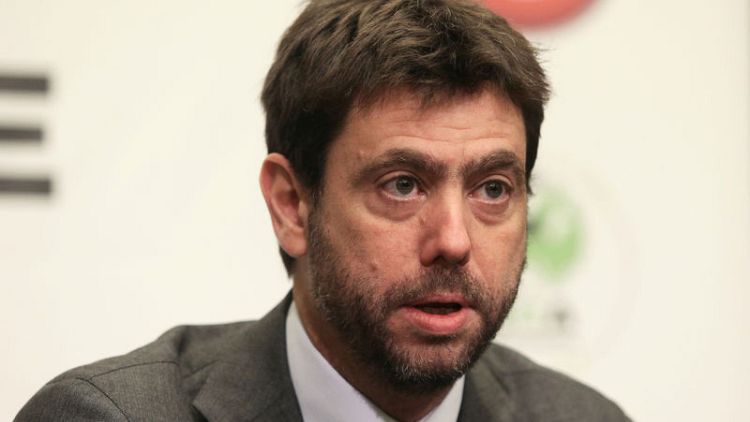By Brian Homewood
AMSTERDAM (Reuters) - European competitions should involve more teams from more national associations, the head of the umbrella organisation representing the continent's clubs (ECA) said on Tuesday.
The ECA, which has begun working on plans for the future of European club competitions together with governing body UEFA, wants to see a system that allows teams to grow and develop over time.
ECA chairman Andrea Agnelli said it was too early to give precise details on what UEFA competitions might look like after the current cycle ends in 2024, however he gave some insight into the body's thinking following a general assembly.
There have been several reports over the past few years of big clubs planning a breakaway Super League.
At the same time, UEFA has been criticised for a revenue distribution system which favours bigger clubs, creating a snowball effect where the wealthier teams get richer year-on-year.
Agnelli, president of Serie A champions Juventus, said participation in European competition should remain "open to all".
He added that clubs should be allowed to take advantage of new revenue streams, turning the flagship Champions League into "the most valuable competition in the world," ahead of the NFL.
Stressing that the ECA was working closely with UEFA and other stakeholders, Agnelli denied media reports that there was a plan to create a Champions League with four groups of eight, saying he had not heard of it.
"There are a variety of options on the table," he said, adding that he expected it to take 12 to 18 months to finalise proposals. Yet he said there should be more clubs involved in European football and on a more regular basis.
"We want more teams and more national associations to have the possibility of participating in a European system and to allow them to properly grow within the system," he said.
"It is about keeping the dream alive."
'WINNING THE LOTTERY'
He added that playing in Europe should be about "developing a club and not just winning the lottery, playing a competition one year and then not again for 10 years."
Agnelli said there were other factors to consider, such as whether teams who are eliminated from the Champions League should parachute into the Europa League.
"There have been lots of critics...saying it makes the Europa league impure from a certain point of the competition," he said. "But you could argue it brings commercial values with better teams coming into the tournament."
Agnelli suggested that there should be "greater harmony" between European domestic leagues so that big fixtures in different countries did not clash.
"On a Saturday evening prime time, you tend to find the best games in every league. Working on a harmonised calendar among leagues could be useful," he said.
He also said there should be a level playing field in terms of the size and the amount of games played by different teams in Europe.
"If you take Switzerland, there are only 10 teams in the league, so 50 percent qualify for European competitions."
Agnelli pointed out that German teams play a maximum of 40 domestic matches a season compared with a top figure of 52 in England, which has a larger league and an extra cup competition.
"That is a 12-game difference, almost two and a half months in football terms," he said. "We want to see harmonisation of the calendar."
(Writing by Brian Homewood; Editing by Toby Davis)
